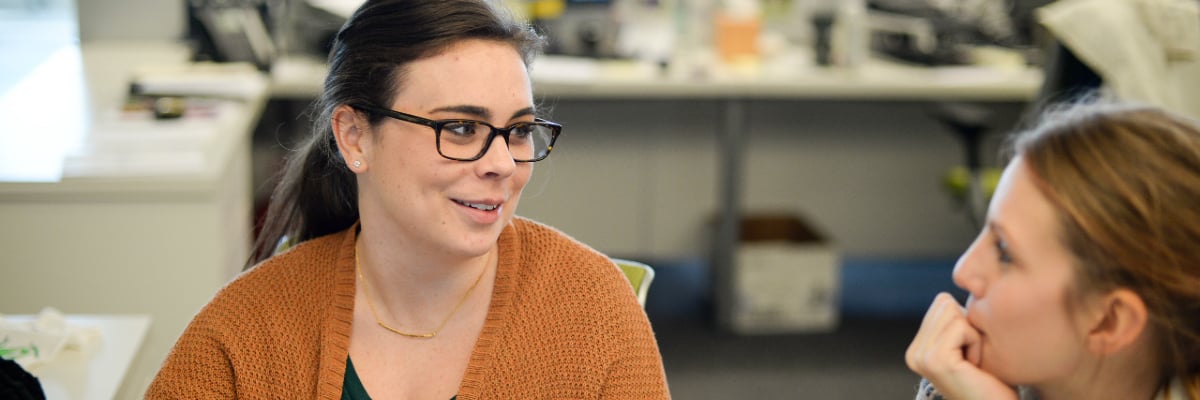
By
Roxane Neal
If you are a college student considering a design degree—or any degree, for that matter—you’re probably stressed, scared, and unsure about your career path.
We at Blink like to mentor those new to the UX field and often chat with students in user-centered design programs. In fact, I recently met with an undergraduate student in the University of Washington’s Human Centered Design & Engineering (HCDE) program, and before my meeting I asked my talented and capable colleagues for advice they wish they had heard in college.
Immense wisdom poured out so I had to share.
The key is many experiences
So many roads, so many options…Many Blinkers learned that having a wide variety of experiences helped them figure out their path or at least get valuable insights about their paths and career goals.
Treat each opportunity as a door—open doors and see what you learn and who you meet—whole new worlds can open up for you. Don’t think about your career path in terms of what you think you should do. Instead, get experience and try new things, even if you don’t think it fits neatly into what you think you’re interested in or what you should be doing. Remember, you never know what you’ll learn or who you’ll meet when you open doors. – Piper
Be brave — sometimes the linear path seems safest (study accounting to be an accountant) but, for me, I got much more satisfaction out of allowing myself an organic path. I prepared and then jumped on opportunities that came my way, even if they were not the “plan.” – Sarah A.
Allow yourself the flexibility to find new interests and potential careers organically. I ended up where I am now due to randomly taking on a part-time job, which led me to discover this industry, landed a mentor in my life, and ultimately led me to grad school and Blink. – Tristan
Get involved in activities that move you – now. Volunteering = free education and experience. – Jessica
Push yourself to try things outside of your comfort zone. Don’t hesitate to try those things you think you can’t do. Don’t be afraid to ask for help. Don’t be afraid to lead. – Jessica
Tackle the stress
You’ll never feel you have enough time and the stress will be overwhelming, but there are many ways to navigate these waters. Learning time management and stress management now will serve you well throughout your life. Blinkers shared lessons learned about pressure and offered practical lessons for managing the load.
Timebox yourself so that you have time to do other activities. Treat every weekday in college like you are working a 40 hour/week job. Be to work at 9:00-10:00 and work the whole day whether you have class/an assignment/test or not. Take normal breaks and be done by 5:00-6:00. Then enjoy your evenings and weekends. – Tom S.
I wish I had known that my grade point average did not matter as much as I thought it did. I missed a ton of opportunities because I was under the assumption that I had to get straight A’s to succeed in life. I put way too much pressure on myself as a college student. Dedicate time to your studies, but also make sure to have fun and enjoy your college experience. I also encourage you to take time to explore and travel. Try new hobbies and activities. I always learn so much about myself when I try new things for the first time. – Katie
Find activities to keep busy (volunteering or exercise or outdoors…). Reason? Because there is lots of “time” in college to worry. And if you’re busy, you’ll worry less. You can’t really tell someone not to worry, but you can tell someone to keep busy. Also – keeping busy/active will create hobbies that you’ll want/need after college – which is a time when you’re really prone to worry! – Katherine
Travel, hike, go to new places, and get out in the world as much as you can. I would say my one regret from grad school is that I kept myself too busy and really didn’t start to explore Seattle and the Pacific Northwest until a year and a half after moving here. – Tristan
Money matters!
You likely have financial advisors at your school that have given you guidance, and you have no doubt read about the student loan debt crisis in our country. While most decisions in college relate to our personal satisfaction, the financial implications of college are important too. Blinkers shared advice about considering the financial implications of going to graduate school.
Pay attention to how much debt you’re accumulating in your graduate program. Take it seriously. Figure out if it’s worth it. You may get into so much debt that it affects your ability to buy a house or live comfortably if/when you have a family in the future. – Piper
Get some real world experience and do an ROI calculation before jumping into grad school. – Sarah A.
Grow from the punches
Learning how to reflect upon and gracefully accept constructive criticism will help you build your skills and grow professionally. Blinkers commented on how to accept input in order to grow.
Listen and respond to feedback on your work. Learn to not take it personally. – Tom S.
Learn to gracefully accept feedback of all kinds. Don’t be afraid to make mistakes and own up to them, and don’t be afraid to reward yourself for your successes. – Jessica
Learn from the best
Think about the people that have influenced you most in your life. Where would you be without their guidance? Mentors are inspirational and invaluable. Many Blinkers had advice about finding a mentor, both while in college and early in your career.
Make friends with the senior people around you in school or work and ask for their story – you’ll learn invaluable lessons that way and maybe gain a mentor in the process. – Jessica
Make a commitment to taking courses from the best instructors on campus, regardless of what the subject is. For these classes don’t worry about whether the class will fit into your career plan or whether you’ll use it someday or even whether you think the topic will be interesting. A great instructor will open your eyes to new possibilities. The only other guideline to this is that an “easy grader” does not make a great instructor. – Tom S.
One of the best things I did was find a mentor. I worked at Scripps and my manager was one of the most influential people in getting me to where I am. Finding someone encouraging, realistic, and smart as hell is challenging, but oh so rewarding. – Ankitha
Writing is in your future
Knowing how to write well is the most important skill you can learn for your professional life. And it is a skill that translates into any career field. Your ability to express yourself and communicate clearly, effectively, and succinctly is critical for school and work. College is the time to become proficient.
Learn to write, fer cryin’ out loud. – Jake
Deciding on a degree
You may be deciding on what kind of degree to get and where to get it. Blinkers had a debate about design degrees and HCI programs.
I wish I had known about industrial design. Its profile has definitely grown over the last few years, but it’s still fairly unknown. For a gearhead + artist combo like me, it would have been the perfect undergraduate pursuit. So many industrial designers I know discovered the profession after already getting a degree that was either “kinda close” or totally different. – Jake
Don’t underestimate the importance of geography/environment when selecting a school or job. Life is too short to live in places where you won’t grow or enjoy life. – Tristan
You should get the best education you can. Move later. For instance, the best industrial design degrees come from Cincinnati, Milwaukee, Detroit. None of those places would be my first choice to move to. – Jake, in rebuttal Tristan’s point
It also depends on what your goal is. For more “theoretical” HCI stuff, I could’ve just stayed put at UCSD. I was way more interested in exploring options in the real world, so a more hands-on program (like UW’s HCDE) was the best fit for me. It just so happened that the school is in one of the kickass-est cities – Ankitha’s addendum to Tristan’s & Jake’s comments
Connections matter
It’s true, what you’ve heard about “it’s who you know.” It’s also true what you’ve heard about your reputation following you. Blinkers weighed in on the importance of networking and maintaining good relationships while in college and in your career.
Keep every business card you get. You never know when you’ll cross paths with people again or when you’ll be able to make a contact in the future. – Piper
Don’t burn bridges. Seattle is a small town and UX is still a relatively small community/industry. There are a few people we met in the HCDE program who we would never want to work with professionally due to how they interacted with people during our grad program. – Tristan
Own your uniqueness
Our innate talents and personality temperaments are unique, and they are gifts! Think about your gifts—what do you have to offer? Blinkers discussed capitalizing on your talents.
And most importantly,… try your best to not compare yourself with others. Get to know yourself. Take time to write down your personal strengths and weaknesses. You are unique in your own special way. Let me repeat that…you are unique in your own special way. Here are some great quotes that help remind me to not compare myself to my family members, friends, or co-workers: – Katie
“If you continuously compete with others, you become bitter. But if you continuously compete with yourself, you become better.” – Anonymous“Don’t compare yourself to others. Compare yourself to who you were yesterday.” – Anonymous
Know thyself. – Nick
Succeeding beyond college
You will no doubt be given many different kinds of advice once you complete your degree. Blinkers shared some words of wisdom once you embark on the next phase of your life.
Spend time on job sites looking at job descriptions of all kinds – there are a million jobs out there you never knew existed. – Jessica
You don’t have to find the perfect job. Just do something that’s interesting, and if you switch jobs or fields later that’s ok. – Brian
Be ready for anything – things won’t go how you expect them to. – Jessica
Know your worth. As a society, we do a poor job of raising assertive women and I see that come out a lot especially in negotiating. Women need to know their worth and go get it. It can be a tremendous shift in thinking; at least it was for me at 22. – Sarah A.
Now is the time to be bold! – Nick
We’re realistic; the odds may be low that 18- or 19-year-olds will even listen to this advice. However, these words of wisdom come from a heartfelt, genuine desire to be helpful and from the pain of learning these lessons firsthand.
What’s YOUR best college advice? We’d love to hear it.
Roxane Neal is a user researcher who gains insights into users’ needs to inform product development teams. She’s equally motivated to extract the wisdom of her beloved friends and colleagues. Thank you to Piper Hackett and all the Blinkers who contributed.
